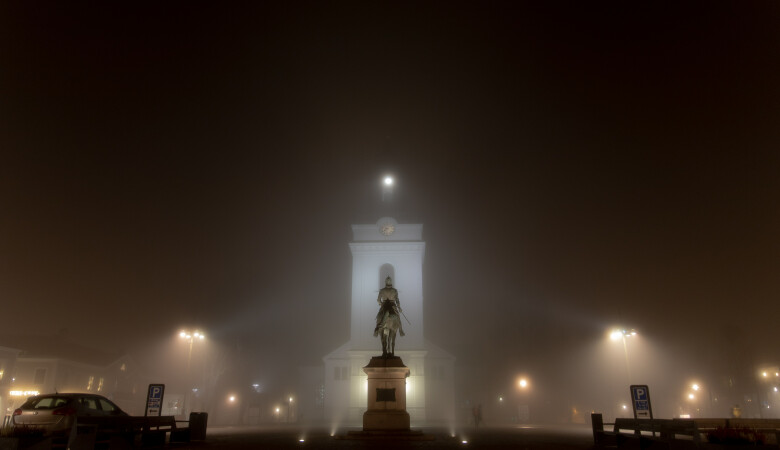God's New People, Chosen and Called (Romans Sermon 71 of 120)
June 19, 2005 | Andy Davis
Romans 9:24-29
Effectual Call, Salvation by Promise, Election & Predestination
I. Introduction: The Call
As I just mentioned, one of the great joys of my life is being a father. I have four children, soon to be five, and I delight in that. I try to be constantly available and accessible to my kids. But this week, as Christie was visiting her mom in St. Louis, I was unusually accessible to them. I brought my cell phone with me while I was teaching the Acts class on Wednesday night. You've probably never seen a teacher or preacher interrupt to receive a phone call. Thankfully, that didn't happen that night because the instruction I gave to Nathaniel, my oldest, is I'm to be your second call after 911, okay?
So you call 911, and then after that, while the person who's bleeding or dying or whatever is being ministered to, give me a call and I'll come home. Other than that, do not call this number at least during this hour while I'm teaching. I did not bring my cell phone with me up here because I see all my loved ones in front of me and so I think I'm okay. We have never been so accessible, though, as a people. I mean, we are ready, at any moment, to receive calls and yet, conversely, we've also invented call screening so that we know who it is that's calling, and some of you may actually not receive the calls if you don't want them. I think that call screening was absolutely designed for telemarketers at dinnertime. We do screen those calls. I hate to say it, it's true, but we do not receive those calls if we can avoid them.
But there are some calls that can't be avoided, or really shouldn't. There's some calls at the higher level that we shouldn't ignore. When I was a pastor up in New England, there was a volunteer fire department up there in Topsfield, and if you volunteer to be a firefighter, you couldn't ignore the call that went out. There was a certain siren they used, and if you were a volunteer firefighter, you were going to listen to that call and you were going to heed it. So also, perhaps, a wedding invitation from your best friend. You're not going to avoid that call, you're going to receive it and you're going to go, especially if you're the best man or the maid of honor. So you're going to go and receive that call. If any of you would receive a personal invitation to a dinner at the White House, would you actually contemplate not accepting that? I would go; no matter what you thought of the politics of the individual, what an experience! Just to go to the White House and sit at a dinner, that would be exciting. And then there's a subpoena from the federal court, okay? That's at a different level entirely. If you decide not to take that call, they may be sending federal marshals to come find you.
So there's just different levels of calls, some of them that we want to receive and are glad to receive, others we have no choice but to receive. Let me tell you something, there's a call in Romans 9:24 that is effective and powerful and produces salvation, and if you're a Christian today, you receive that call. You were called to be a vessel of glory, you were called to be a child of God, and you were called in an effective and powerful way by God, who created the universe out of nothing, and who likens the creation of the universe out of nothing to what he does in your heart to make you a Christian, and that's a marvelous thing to contemplate, isn't it? The powerful call of God that brings you to life spiritually and makes you a child of God. And what a joy it is to study that and to understand it, and how delightful it is.
II. The Context
Now, let me try to set this thing in context. We've been through a lot of truth already in Romans 9, let me try to just put it in capsule form. You may wonder why I didn't do that the first time and just do it all in one message. I guess I could do that, but there's so many wonderful truths, aren't there, in Romans and we've been learning about the sovereignty and the great power of God. The issue that the apostle Paul is dealing with has to do with the promises of God. It has to do with the word of God, and he's made us some marvelous promises in Romans 1-8, and there's a resounding crescendo at the end of Romans 8, in which we are assured that nothing in all creation will be able to separate us from the love of God that's in Christ Jesus, our Lord. And yet here we have this terrible difficulty the apostle Paul faces concerning the Jews.
As in our day, so also in his day, the overwhelming majority of Jews were rejecting Christ. The overwhelming majority of Jews were not trusting in him for their personal salvation, and that brought the word of God, it seemed, under question. Has the word of God failed for the Jews? That's the issue that Paul's wrestling with here. Very significant, and his answer, as we've seen in Romans 9:6 is, absolutely not. It is not as though God's word has failed. Well why not, Paul? Because not all who are descended from Israel are Israel. Come again? What he's saying is that just because you're physically descended from Abraham, you are not necessarily spiritual Israel. There are the biological descendants of Abraham and then, within it, a smaller group which he calls, in our text today, the remnant. A smaller group of people to whom the promises were savingly made. God's word to them has not failed; indeed, it cannot fail.
Then he unfolds the whole mysterious doctrine of unconditional election, that we've seen, Romans 9:6-13, that whole section dealing with unconditional election and, ultimately then, after that, he deals with the issue of justice and God's freedom in doing this. Is it right and just for him to have this sovereignty, this unconditional election, is it right and just and fair? And he deals with that. Now, all of that has been a parentheses and now we're getting back to the issue of the calling of God. He mentioned it in verses 11 and 12, and he gets back to it now, here in verse 24. Now, in the verses that we're studying today, there were two remarkable shocks for the Jewish people. Shock number one was that the Gentiles are included as God's new people. That's a shock for the Jews. Very, very difficult for them to accept that the Gentiles are included, that we actually can be the people of God through faith in Jesus Christ. That's the first shock.
The second shock is that many Jews are not included among the people of God, only the remnant will be saved, and that is the second shock. And he supports the first with verses, two passages from Hosea, and he supports the second with two passages from Isaiah.
Now, I made six observations in this text and I'd like to unfold them briefly, each one, in our message today. The first is that there is a new people of God. There is a new people of God that is formed by the Word of God, it is the "us" of verse 24, We are the "vessels of mercy." It says "Even us." The vessels of mercy, prepared in advance for glory.
Secondly, there is such a thing as the sovereign call of God that makes this new people of God come to life. It is this calling of God that produces the people of God.
Thirdly, this sovereign calling of God happens within the context of a human call, a human preacher, a pastor, a missionary, a friend, a witness for Christ, who speaks the word of God and, within that, God calls individual people to repentance in faith. There is the human call of the Gospel.
Fourth, some Jews and Gentiles are both included in the new people of God. We are comprised out of Jew and Gentile. "Even us," Paul says, "whom he called, not only from the Jews, but also from the Gentiles." So this new people of God is made up of both Jews and Gentiles.
Fifth, we, both Jews and Gentiles, are called out of our ethnic group into a first and greatest allegiance to Christ. He becomes our Lord, and that heavenly country to which are going, that's our true nationality. We're merely aliens and strangers moving through here. We may be Americans, we may be Chinese, we may be Koreans, we may be Caucasian, we may be African-American, we may have all kinds of characteristics here on Earth, but we are called out of allegiance to all of those things to a primary allegiance to Christ and to the new people of God to which we belong.
And then finally, sixth, we are, all of us, universally humbled by the process. God intended to save us in such a way that we would know we were saved by mercy. We were saved by grace, so nobody can boast. The Jews can't boast, the Gentiles can't boast. All of us were, at one point, not God's people. And we were, at one point, brought to be God's people, through repentance and faith in Christ. There it is, there's six points of this.
III. The New People of God: “Even Us”
Let's look at it a little bit more in detail. Let's look at the first one, and that is this idea of a new people of God. There is a new people of God, it is the "us" or the "even us" in verse 24, we are the ones. Now, I think if we could go back one verse, we'll get a clearer understanding of what Paul means there when he says "even us" in verse 24. Look at verse 23, "What if he did this to make the riches of his glory known to the objects of His mercy, whom he prepared in advance for glory, even us, whom he also called, not only from the Jews, but also from the Gentiles?" We are objects of God's mercy, we are prepared in advance for glory, what an incredible thing. We are the new people of God, and we're made up both of Jews and Gentiles, as we'll get to in a minute. Now, God has a people. There is a people that God means when he says "I will be their God and they will be my people." He has this in mind, he is always had it in mind.
In Jeremiah 31:33, the prophet Jeremiah says, "This is the covenant I will make with the house of Israel; after that time, declares the Lord, I will put my law in their minds and write it on their hearts; I will be their God and they will be my people." So this is the people of God, but the question is, who are the people of God? Who are God's people? And if I put in the word "chosen," God's chosen people, your first thought might be Jews, the Jews are God's chosen people. Well, the teaching that we get here in Romans nine is that that is not the case. There is a new chosen people of God that's comprised of both Jews and Gentiles together, who have come through faith in Christ. We are the new people of God.
Now, God did dangle that language in front of the Jews at Sinai. In Exodus 19, God said this. "Now if you obey me fully and keep my covenant, then out of all nations, you will be my treasured possession, although the whole Earth is mine, you will be for me a kingdom of priests and a holy nation." Did you notice the key word at the beginning there? It's the little word "if." It's conditional. "If you obey me fully… you will be my people," that's what God was saying there. Did the Jews obey God fully? While Moses was up getting the stone tablet version of the 10 Commandments that had already been preached by the mouth of God, they were already breaking it with the golden calf. They're already breaking the covenant, right away, right from the start they were breaking the covenant. Israel broke the covenant, and they didn't do it just once, they broke it again and again, repeatedly broke the covenant of God. As Jeremiah said very plainly, "They did not remain faithful to my covenant and I turned away from them, declares the Lord." They broke the covenant.
Now, one prophet who had an interesting ministry, who was called on to, in some way, through his life, display this broken relationship between Israel and God, was the prophet Hosea. Now, if you think you have a tough ministry, think about Hosea. The word of the Lord comes to Hosea and he is told to marry a daughter of unfaithfulness, is what she's called in Hosea. She was a prostitute, she made her living through immorality, and Hosea the prophet, a godly man, was called to marry this woman. What an incredible calling that was. Hosea had to deal with Gomer, he had to deal with the indignities of her promiscuity, her wandering lust, her lovers and her illegitimate children. Hosea, at one point, had to hunt her down and buy her off the slave block. What a shameful, shameful relationship, to have to say, "That's my wife up there, I got to buy her back, I get to redeem her." What a sad and a shameful thing.
And she conceived babies by who knows whom, and Hosea named them, appropriately, "not loved" and "not mine." Those were the names of the babies that Gomer conceived. "Not loved" and "not mine." That's who they were, and that became a symbol for Israel as a whole, they were not loved and they were not God's people. That's what was being said there in Hosea. Now God has created a new people, it is the "even us" from verse 24. We are the people of God, we are the vessels of mercy, we are the ones that are prepared in advance for glory. God has a new people and it's us and this new people is new because they include not just Jews, now, but also Gentiles, it's a new work that God is doing. Now at one point, Gentiles were excluded. I'm going to talk more about that in a minute, but Paul in Ephesians two, says that out of the two, Jew and Gentile, he's made a new thing, a new man, "one new man out of the two, thus making peace."
Now, this one new man is the new people of God, and we are called new because God is doing a new thing in the world among both Jew and Gentile. We are new because both Jew and Gentile get saved by a new covenant in the blood of Christ. We are new because both Jew and Gentile get saved by being ourselves individually transformed into a new creation. We're made new through the blood of Christ, this is the new people of God. And to them, God makes his promises, to them God will keep his covenant. They are the ones that God is addressing here in Romans 9. It is for them that God pours out his love, it is in them that God works by his power, it is for them that God orchestrates history, and with them God will dwell eternally in heaven. The new people of God, "even us." Are you included? Friend, are you included in the new people of God? Are you in the "us?" Can you say "even us?" Are you included through faith in Christ?
IV. The Sovereign, Effectual Call of God
The second point I want to make talks about the sovereign effectual call of God. The sovereign effectual call of God. The key question is, how does this new people come to be? How are they created? Or really, we could say recreated. And the answer is, right there in the text, look at verse 24, "Even us, whom he also called, not only from the Jews, but also from the Gentiles." It's the calling of God, the sovereign effectual calling of God. Now, he had already mentioned this back, and I said that all of the defense of his sovereignty, the justice of God and it does not, therefore, depend on man's desire or effort, but on God who has mercy. All of those verses, that was a big parentheses. He's bringing up unconditional election back in verses 11 and 12. Look what it says there in Romans 9:11-12. There, he's talking about not all Israel are Israel, and he brings up the case study of Jacob and Esau, the twins that are inside the same woman. And he says, "Before the twins were born or had done anything good or bad, in order that God's purpose in election might stand, not by works, but by him who calls," there's the word, calling, "by him who calls, she was told the older will serve the younger."
Now, God's purpose in election, as we studied at the time, was that he would get the glory and we get the joy. That's a good exchange, don't you think? God gets the glory because it's all his work. He gets the glory, we get saved. We get saved in a way that he gets all the glory. No flesh will boast before him, he gets the glory, that's God's purpose in election. So he's going to work in such a way that we can't boast. An unconditional election accomplishes that. Now, God's purpose in election therefore comes, listen, "not by works, but by him." Just stop right there. Remember that we said the focus is on God, there in that verse. The focus is on God, it's not by works, but it's intrinsic to God and God alone. He's not looking outside of himself to find out about election, it's all within himself. Not by works, therefore, but by him, by God.
But notice that's not all it says. He doesn't stop there, he says something interesting. "Not by works, but by God" would be true, but he goes beyond it. "Not by works, but by him who calls she was told the older would serve the younger." Now, what is this calling? Well, I believe that this is a calling that creates what it calls. It's a special kind of call and it's something only God can do. Take a minute, if you would, and look back at Romans chapter 4. We've already seen this calling once in Romans, Romans 4:17. There, it's talking about the case of Abraham and how he became the father of Isaac. Isaac then becomes a picture of a child of God, Isaac becomes a picture of a believer. How did Isaac come to be? That's what Paul's wrestling with in Romans 4. Now look what at he says in verse 17, "As it is written," speaking of Abraham, "I have made you a father of many nations, he is our father in the sight of God, in whom he believed."
Now listen, listen to what Paul says about God, "The God who gives life to the dead, and calls things that are not as though they were." Is that not powerful? Our God is a creator. He creates out of nothing. He created the universe out of nothing. He spoke into nothing and there was something. This is the sovereign and powerful call of our Almighty God. He has the ability to call things that are not as though they were. He can do that. Now, Abraham's body, Romans 4 tells us, was as good as dead, since he was about 100 years old, and Sarah's womb was also dead. She'd been barren all her life. And yet God spoke into that deadness, he who is able to give life to the dead, he who is able to call things that are not as though they were, and he says, "Let there be Isaac." And there was Isaac.
It's a call that cannot be refused. It's a powerful call. It's an awesome call. It's a call that creates what it calls, and that's exactly what's going on here. Go back to Romans 9, look and see, "Even us," it says in Romans 9:24, "whom he also called." It's similar to what happened in John 11, when Jesus stands outside Lazarus's tomb, and he says, "Move the stone," and they moved the stone, and then what does he do? After praying to his heavenly Father, he gives a call and he says, "Lazarus, come forth."
Now, you have to know that along with the vocal command comes the power to obey it. You try it, actually don't. But I mean, if you went to a tomb and said, "Come forth," they would not come. Why? Because you don't have the power to call things that are not as though they were. You don't have the power to give life to the dead, but God does. And He has the power to call to people who are not a people and make them a people, whether they're Jews or Gentiles, He can do that. Amen. He has the power to do to that, He has the power to work in your life, He has the power to work in my life, He has the power to call righteousness in my life in a place where it wasn't before. He has the power to give life to my dead body when I'm molding in the grave. He has the power to do that. He's the one who can say, "Let there be light," and there is light. It is a call that cannot be refused. It's a call that creates what it calls.
And you know something? If you're a Christian here today, that's what happened to you. To glory, to God be the glory for what happened to you, that's what's happened to you. God called and created life. He who said, "'Let light shine out of darkness,' made His light shine in your hearts to give you the light of the knowledge of the glory of God in the face of Christ." That's 2 Corinthians 4:6. It's the God who creates what He calls, and it's in the call that He does the creating. Now, some theologians have called this irresistible grace. You know something? I don't quibble with it. How does the darkness resist the light that God created? "No, I'm just not going to be light. I just won't." Or, "I'll think about it, I'll get back to you, God, on the light thing, okay?"
No, He says, "Let there be light," and there is light. And He speaks into your dark heart and He says, "Let there be the knowledge of the glory of God in the face of Christ," and there is. That's what God can do, that's called being born again. You can't refuse it, and so that's why theologians call it irresistible grace. But I don't like it because it gives the image that people are being dragged, kicking and screaming like robots into the kingdom. "Oh, I hate this stuff, you know, I hate these holy rollers, these Bible thumpers. Why would I want to spend eternity with them?" And in that condition they're dragged in and here they are. "I didn't want to be here, but here I am. Irresistible grace. What could I do? Hog-tied and dragged." That is not the correct picture.
What I like to think of instead is effectual grace, that God sends forth His word and it creates that which it was intended to create. Frankly, it's really healing that which was broken by sin. What could be more desirable than Christ? Tell me, what could be more appealing, more enticing, more beautiful, and more wonderful? But it's the sinner that says, "I'm not interested in Christ." God heals that by His powerful call, effectual calling.
V. The Human Call of the Gospel
Thirdly, we see that it comes in the human call of the Gospel. Now, you don't see it here, if you're saying, "Well, then why are you mentioning it?" Well, because I think it goes together with this word 'call'. We're going to see it much more in Romans 10. Go over one more chapter, Romans 10. And there in Romans 10:13-15, talks about a different call, not the one I have in mind right now, but a different call. "Everyone who calls on the name of the Lord will be saved." That's the sinner calling out on Christ saying, "Save me Jesus, save me from sin." That's the call, and everyone who does that will be saved. "Everyone who calls on the name of the Lord will be saved." But then Paul goes on in verse 14, "How then can they call the One they have not believed in? And how can they believe in the One of whom they have not heard? And how can they hear without someone preaching to them? And how can they preach unless they are sent? As it is written, 'How beautiful on the mountains are the feet of those who bring good news.'"
You know what that's talking about? That's talking about the human preaching of the Gospel. It's happening right here, right now, in this pulpit. It's happening in many pulpits across this land, it's happening around the world right now. Human beings are preaching Christ, they're proclaiming Christ, it's a human call. And therefore there are two calls of the Gospel. One of them an external human preaching, the other an internal sovereign powerful call like, "Let there be light," and there's light. And the external one is the cloak of the internal one, and they go together in the elect, they go together in the redeemed, and they're powerful and effective. But they don't always go together for everybody. And so you can preach to a huge crowd of thousands of people, and some of them will get it and they'll be saved and they'll repent and they'll love it, and others will be like, "When's it over? Bored, they're disconnected, they're not interested, it's not happening in their hearts. But to others its like it's the greatest message they ever heard. It was life to me.
So, what is this call? Well, it may be Billy Graham at a huge rally at Yankee Stadium, it might be a coworker on a coffee break, just the two of them talking about grace. It might be a missionary in the steamy jungles of Irian Jaya, like New Tribes Missions using a storytelling approach to redemptive history, it could be that. It could be a street preacher in Philadelphia, just standing on the corner with a bullhorn preaching about Christ. It could be a mother and a father quietly, day after day, year after year, explaining Christ to their growing children. Could be a pastor preaching an expositional message in Romans, or a Sunday school teacher on Easter Sunday explaining the empty tomb. Might be a persecuted Christian saying through bleeding lips to the very one who's beating on him or her until they're dead, "Repent and believe in Christ," preaching Christ to the very one who's persecuting.
It might happen at VBS, it might happen through a Gospel track, it might happen through Trans World Radio, it might happen in a lot of different ways. What is the message? That God the Creator, that God the Father, sent His only begotten Son into the world, Jesus Christ, who lived a sinless and holy and perfect life, and who was our substitute at the cross, who took our place, who died on the cross in our place, taking our wrath, our judgment, on Himself, and extinguished it in His death, and who was raised to life on the third day. That is the Gospel, and anyone who calls on that name will be saved. That simple message, it's going off throughout the world. Many of you have been faithful this week perhaps, even to witness and to share the Gospel, it's the human call. And there's lots of different ways it happens.
George Whitefield was a famous preacher, he used a very dramatic style, very theatrical. He would act certain things out, he was powerful to listen to. He would sometimes call on an angel and ask, "Isn't their room for one more in Heaven before the angel goes and says, 'All the elect are saved'?" And then there's this back and forth between God and the angel, and by the time you listen to this, people are like, "I want to be the last one please." And there's just tons of people believing, that was Whitefield's style. And then there's Jonathan Edwards who's got these tiny little notes, and he's just standing there reading like this, and hundreds of people are being saved because of the potency of what he's saying. External call in both cases.
It could be Charles Spurgeon, maybe the greatest preacher of the 19 century, a man so exceptionally gifted at preaching, communicating the Gospel, that he went into the Agricultural Hall where they were going to have a big rally for Christ, and he went in to test the acoustics, and he says, just to test the acoustics, thinks he's totally alone, "Behold, the Lamb of God who takes away the sins of the world." And way up in the rafters is some worker up there working, doing some work. He thought he was alone. He thought it was the voice of God and he was saved, he was converted. In the external call of the acoustic testing came the internal call of the gospel of God, and it created life where there wasn't before. Its's a true story.
And it's so mysterious how the two are related, it really is. I mean, they send you to the seminary to study the techniques. God does different things in every generation, it's different in every preacher, it's different even in every occasion, in every encounter. There's some basic things that are always going to be the same, but there's some things that are different. Like how did Spurgeon himself get converted? He's going one snowy morning, he can't get to his regular church, so he ends up at a primitive Methodist Chapel, the last place he imagined he would be when he woke up that morning. So he turns into this primitive Methodist Chapel, and the regular preacher wasn't there. And this Spurgeon's own testimony, this is so good, I just want to read it to you. This is his own words about his conversion. "The minister did not come that morning, he was snowed up, I suppose. At last, a very thin looking man, a shoemaker, a tailor, or something of that sort, went up into the pulpit to preach. Now, it is well that preachers be instructed, but this man was really stupid."
Let me read that again. "Now, it is well that preachers be instructed, but this man was really stupid." Now, I look at that, and we teach our children not to say that word, but here is Spurgeon, and this is how he's describing the man who led him to Christ. "He was obliged to stick to his text for the simple reason that he had little else to say. He did not even pronounce the words rightly, but that did not matter. There was, I thought, a glimmer of hope for me in the text. 'Look unto me and be ye saved, all the ends of the Earth.' Isaiah." And he was saved. The external call was rather shabby, frankly, rather shabby, but the internal call of God was sovereign and effective and he was converted. It's remarkable.
VI. Some Jews and Gentiles Both Included
The fourth thing is that some Jews and Gentiles are both included. It's not just Jews anymore who are the chosen people of God. This is a shock for the Jews that the Gentiles are actually included. Look what he says in verse 25-26, as he says in Hosea, "I will call them my people who are not my people, and I'll call her my loved one who is not my loved one. And it will happen that in the very place where it was said to them, 'You are not my people', they will be called sons of the living God." And let me tell you something, I cannot fully communicate to you how shocking these verses applied to Gentiles would have been to these Jews. If you read it in context, it's basically, it seems it's God's way of bringing the Jews back. You know the whole Hosea and Gomer thing? It's like, "Alright, it's bad now, and they're not His people, but He will restore them and bring them back." That's the natural reading of Hosea 1. But here, Paul, in Romans 9, under the inspiration of the Holy Spirit, is applying it to Gentiles, the people who are not the people.
The Jews who had been kicked out, and so they were, but it's also Gentiles. And the basic idea is this, if God has the power to turn people who are not my people, into people who are His people, He can do it for Jews and Gentiles alike. He can do that, He has that power to turn people who are not a people of God into actually being believers, He has that power to do it. Now, the Mosaic Law viewed Gentiles as outsiders. There were regulations, you had to be circumcised. There are all of these regulations that the Jews had... The law of Moses therefore set up, what's called in Ephesians, a barrier or a "dividing wall of hostility." Jews on the inside, Gentiles excluded. They're on the outside, they're "separate from Christ, excluded from citizenship in Israel, and foreigners to the covenants of the promise, without hope and without God in the world." That’s Ephesians 2. That's not just a prejudice, that was really true, God set those rules up. But the Lord had an eternal plan for Gentiles.
The Gentiles aren't Johnny-come-lately, as if He never really thought about Gentiles until the Jews rejected Christ. That is false. From the very beginning of the call of the Jews and the call of Abram, God said to Abram, that through his offspring all peoples, Gentiles, all the Earth will be blessed. From the very beginning, God has a sovereign plan for the Gentiles. And now at last, in Christ, it's coming to pass. Through the offspring of Abraham, namely Jesus Christ, we Gentiles are getting blessed, we're getting saved. And so we see the incredible riches of God's grace.
Look at Verse 26. "It will happen that in the very place where it was said to them, 'You are not my people', they will be called sons of the living God." Is that not magnificent? Isn't it incredible to be a Christian? Isn't it wonderful to have the indwelling Spirit crying out "Abba Father" within you? And isn't it great to be Father's Day and talk about it? It's a wonderful thing to have a godly father, it really is. Not everybody has one, but it's a wonderful thing to have a godly father. And praise God for it, if you have it. But if you're a child of God, the real issue is you are adopted by the living God. The living God is your father. You can call Him Abba Father, and He will welcome you through faith in Christ. "In the very place where it was said to them, 'You are not my people', they will be called sons of the living God." And He can do that from both Jews and Gentiles alike, He has that power.
Are you a child of God? Have you trusted in Jesus Christ? Have you repented and believed in Him for your salvation? Then you're adopted into the family of God. I think, of all the huge treasure box of riches that we have in Christ, it may be the most shocking and surprising that God would actually adopt us into His family. It's amazing.
VII. Called OUT FROM and Brought INTO
Fifth, we are called out of and called into. It says, "Whom He also called, not only from the Jews but also from the Gentiles." Your first loyalty is to Christ, not to whether you are Jew or Gentile. That is not the issue. It says in 2 Corinthian 6:17, "Therefore, come out from them and be separate says the Lord. Touch no unclean thing and I will receive you." And then this one, Psalm 45:10-11, which is a marriage song, but which, I think, has end time implications. It says here… Think of us as the bride of Christ. "Listen, O daughter, consider and give ear: Forget your people and your father's house. The king is enthralled by your beauty. Honor Him, for He is your Lord. Leave your people and come be part of a new people of God." Let that be your loyalty. Folks, we are aliens and strangers in this world, this is not our home, we're just passing through. And therefore, we are not primarily Americans, or primarily Chinese, or primarily Hispanic, or primarily African-American, or primarily even male or female. We are primarily children of the living God, that's our loyalty.
And so when the fourth of July comes along, celebrate, enjoy, have a good time, have a picnic and barbecue, but understand, do the whole thing knowing you're not ultimately citizen of the US A. You are a child of God, and you are moving through to a heavenly country which will never end. That's your true home, your true place. We are called out of, and called into.
VIII. Universally Humbled by What We Were
Finally all of us, Jew and Gentile alike, are universally humbled by the process. That nobody that can boast and say, "Yes, but we were the real people of God." The Jews can't do that because they were called "Not my people." The Gentiles can't say, "Yes, but He loves us best." All of us have sinned and fall short of the glory of God. We are all humbled by this process. Look what he says in verse 27-29. "Isaiah cries out concerning Israel, 'Though the number of the Israelites be like the sand by the sea, only the remnant will be saved, for the Lord will carry out His sentence on Earth with speed and finality.' It is just as Isaiah had said previously, 'Unless the Lord Almighty had left his descendants, we would have become like Sodom, we would have been like Gomorrah.'"
Oh, this is sharp and humbling for the Jews. He goes right to the source of their national pride. "Though the number of the Israelites to be like the sand by the sea," those words were spoken in Genesis 22:17, by God to Abraham. And he says this very plainly, "I will surely bless you and make your descendants as numerous as the stars in the sky and the sand by the seashore." And Isaiah says, "Yeah, that may be true, but only the remnant's going to be saved." And so Jacob went down to Egypt, 70 in number. Within four generations, they grew to two million approximately in number. God fulfilled His promise to Abraham, but most of those people died in the desert. They never made it to the promised land. The remnant will be saved, the remnant, the chosen ones from within the Jews, the remnant.
And we'll talk more about the remnant we go on. And the second quote in Isaiah one, even more shocking. "Unless the Lord Almighty had left us some survivors, a remnant, we would have become like Sodom, we would have been like Gomorrah." The very next verse, Isaiah 1:10 says, "Hear the Word of the Lord you rulers of Sodom. Listen to the law of our God, you people of Gomorrah." He calls them Sodom and Gomorrah. He doesn't just say it's theoretical, they are no different. You know what I get out of this, folks? It's a very, very simple saying, We've heard it before, "There but for the grace of God go I." There is no one you can look at, no one you can point a finger and say, "Yeah, I would never do that." If you would never do that, it's because of the grace of God in your life. We are humbled by that, aren't we?
Basically, he's saying to the Jews, "You know what? Except for the grace of God, you'd be just like Sodom and Gomorrah." What are they? The most wicked and perverted Gentile cities there were. You'd be the same, but the grace of God's been at work in you, calling out a remnant and protecting them. There but the Grace of God go I. This is a universal humbling. Basically, this is it, God has the power to take people who are not His people, either Jew or Gentile, and bring them over and make them His people. He has the power to take people who are not loved and bring them in, make them loved, eternally loved. This is the grace and mercy of God. All of this to the praise of His glorious grace, so that we are all humbled and we are all shown mercy. For it says in Romans 11:32, "For God has bound all men, Jew and Gentile alike, over to disobedience, in order that He may have mercy on them all."
And so you know what? Christian friend, Christian brother and sister, when you get there on the other side and you're past Judgment Day and you're there, and looking around at that multitude from every tribe, and language, and people, and nation, who were saved by mercy and grace just like you, you will boast in Christ, and in Christ alone. Christ is your righteousness, Christ is your Savior, Christ is your redeemer, Christ is your hope. He is your Lord and He will be your boast on that final day.
IX. Applications
Now, what application can we take from this? Well, first, I don't assume that everybody here is a Christian. I don't know that you're all going to Heaven, I don't know that you're all children of the living God right now. Don't you want to come to Christ? Aren't you attracted by Jesus? Aren't you hearing within the kind of hull of this message, this human communication, a call of the living God to repent and trust Christ? Couldn't today be for you a day of salvation, the day of salvation, the day when the Holy Spirit entered your life and everything changed? Come to Christ. Can I urge you if you are hearing God speak to you right now, don't walk out of here without talking to me. You can come up during the invitation and talk to me. I've told you before, I have a hard time hearing while the music is playing. And I like the music, so let's play the music, but then afterwards, stay and talk to me. It's not two minutes of work we can do together, we can sit and talk about your soul. Don't leave here without being saved.
If you are a Christian, rejoice in the surprising, amazing grace of God. Think about what God used to save you, the external human call. Who did God use to save you? And then ask, "Are you willing to do that for somebody else?" When was the last time you opened your mouth and said something about Christ to somebody? Do it this week, invite somebody to church. I like what's in the bulletin, they talk about a new technique. "Would you like to know how to get to Heaven from Clinton, North Carolina?" That's clever, I like that. I going to try it. Not Clinton, I'll do Durham. Would you like to know how to get to Heaven from Durham, North Carolina? It's intriguing. Makes you want to say, "What do you mean?" Let's talk to people, let's give the external call, and then let God do what He will with the internal call, He's the only one that can do it. Close with me in prayer.






























